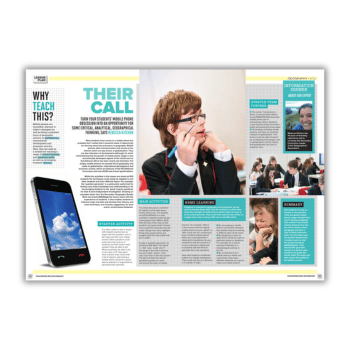Turn your students’ mobile phone obsession into an opportunity for some critical, analytical, geographical thinking with this globalisation KS3 lesson plan from Rebecca Kitchen…
Mobile phones are incredibly relevant to today’s teenagers. They’re also a potential focus of geography lessons on globalisation, international development and economic activity.
In this lesson you’ll use them as a context for teaching a range of critical thinking and analytical skills. You’ll also develop students’ literacy.
Globalisation KS3 lesson
Most students have access to a mobile phone. However, they probably don’t realise that it presents loads of opportunity for learning about key processes in geography.
Mobile phones allow communication and access to the internet which are key drivers of globalisation. They are also indicators of development. (However, it’s worth remembering that the growth of mobile phone usage in less economically developed regions of the world such as Sub-Saharan Africa has been recent and dramatic).
Put simply, mobile phones are packed full of geography. They relate to globalisation, international development and economic activity. These are features of the KS3 national curriculum and GCSE and A-level specifications.
Whilst the activities in this lesson are aimed at KS3 students the techniques could easily be adapted to suit older students and even different topics.
For example, the ‘question generator’ is a particularly useful tool for testing case study knowledge and understanding. You can also use it to encourage students to ask ‘good’ enquiry questions for their A-level Independent Investigation.
Drawing on examples taken from the Secondary Geography Quality Mark, this globalisation KS3 lesson starts with the experiences of students.
It also enables students to interpret maps and data and develop their literacy and exam technique, and includes suggestions for local and/or school-based fieldwork.
Rebecca Kitchen has 16 years of teaching experience and is currently the Secondary Curriculum Leader at the Geographical Association.











